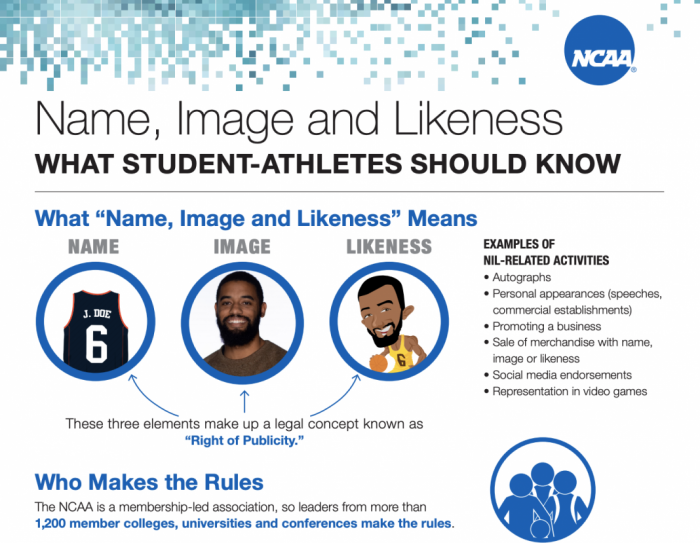By Nancy Scuri
Campus News
As of 2021, the National Collegiate Athletic Association (NCAA) revised their decades-old prohibition on a student athlete from marketing and profiting from their name, image and likeness (NIL) agreements and voluntary registration for NIL service providers (sports agents, financial advisers, athletic consultants, etc.). To discuss these changes, Campus News sat down with Sara K. Wake, an attorney with extensive experience in university policy, as well as experience serving as a committee member for the NCAA. This interview was lightly edited for length and clarity.
Campus News: The fact that Division 1 teams were able to secure lucrative endorsement and broadcast deals for their athletic teams made up of “scholar athletes” has been known for some time. What caused the NCAA to change their approach to their NIL rules, allowing student athletes to profit from their NIL starting in the summer of 2021?
Sara K. Wake: In late June 2021, the Supreme Court of the United States unanimously decided in the Alston case that college sports are a profit-making enterprise and rejected the NCAA’s position that college athletics are exempt from the normal operation of the antitrust laws. Justice Kavanaugh authored a much-discussed concurring opinion, in which he questioned whether academic institutions could continue to “justify not paying student athletes a fair share” of billions of dollars in revenue and suggested that student athletes could “engage in collective bargaining” to solve this problem. He further noted that “[t]he NCAA’s business model would be flatly illegal in almost any other industry in America.” Although the Alston decision was itself quite narrow, addressing the NCAA’s rules on only certain education-related benefits provided to Division I Football Bowl Subdivision players and Division I men’s and women’s basketball players, the opinion—and Justice Kavanaugh’s concurrence in particular—reflected changing attitudes about college athletes. At the same time, some states were starting to pass laws allowing student athletes to profit from their name, image, and likeness, which was previously prohibited by NCAA rules. The NCAA suspended their NIL rules effective July 1, 2021, and implemented an interim policy allowing students to profit from their NIL.
CN: These rules currently only apply to Division 1. While other colleges and universities don’t usually command the dollars that higher-ranked schools do, what sort of ripple effect might we see in lower-ranking programs as a result of the NIL disclosure requirements for D1 schools?
SKW: I think it’s fair to assume that the NIL framework implemented within Division I will eventually apply to other student athletes as well. Student athletes in all three divisions have opportunities to earn money for their NIL.
CN: Are there any special considerations if a student is transferring from one university to another (Div1 to Div2, or vice versa)?
SKW: Not that I’m aware of! Things could potentially change in the future, however.
CN: The bulk of our readers at Campus News are either in two-year programs or community colleges, usually with a goal to transfer to a four-year college or university. What should they be aware of before they transfer?
SKW: I think it’s important for students to consult a trusted advisor on NIL as these rules continue to evolve and as the national landscape related to collegiate athletics continues to change.
CN: The new framework is scheduled to come into effect in the Summer of 2024. What is included at this time?
SKW: The Division 1 Council is scheduled to meet in the Spring of 2024 to further discuss proposed rules. Currently, the framework includes the following:
Voluntary Registration: The NCAA will establish a voluntary registration process for NIL service providers, including potential agents, financial advisers, and consultants. This process aims to collect and publish information on service providers, making it available to student-athletes and schools in order to facilitate informed decision-making.
Disclosure Requirements: Student-athletes will be required to disclose to their universitys’ details and information on any NIL agreements greater than $600 in value no later than 30 days after entering into the NIL agreement. This includes disclosing contact information for all involved parties and NIL service providers; the terms of the agreement, including services rendered; term length of the agreement; amount compensated; and pay structure. Schools will then provide deidentified data to the NCAA biannually for a database accessible to student-athletes. Notably, many states already require disclosure of NIL deals; the NCAA’s new rule establishes a national requirement.
Standardized Contract: The NCAA will develop a template contract and recommended contract terms and collaborate with schools to educate student-athletes on contractual obligations.
Comprehensive NIL Education: The NCAA plans to create comprehensive education for student-athletes and their support networks, covering policies, rules and best practices related to NIL.
CN: What else should students know about these new rules? What should they be doing (or not doing), so they can avoid problems later?
SKW: My biggest concern is that students will receive bad advice on NIL deals, including tax consequences thereof. I think it’s important for students to consult a trusted advisor when navigating NIL deals.
Campus News would like to thank Ms Wake for her time and expertise. Everyone’s situation will be different, and any student who may be impacted is advised to seek out a legal professional to discuss any concerns, as this article cannot be taken as legal advice.
 Sara K. Wake, a noted lawyer in the field, is a former member of the NCAA’s Division I Committee on Infractions. She is now a partner at the law firm McGuireWoods and represents colleges and universities on policy issues, among other topics. She can be reached via her website at https://www.mcguirewoods.com/people/w/sarah-k-wake.
Sara K. Wake, a noted lawyer in the field, is a former member of the NCAA’s Division I Committee on Infractions. She is now a partner at the law firm McGuireWoods and represents colleges and universities on policy issues, among other topics. She can be reached via her website at https://www.mcguirewoods.com/people/w/sarah-k-wake.





Facebook Comments